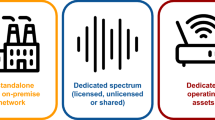Abstract
The demand for QoS provisioning support over Internet grows continuously. One of the factors contributing to this demand is the increasing penetration of Application Service Providers (ASPs) to the market. This necessitates the development of mechanisms for the efficient realization of Service Level Agreements (SLA). In this paper, we develop and evaluate an approach for efficient SLA selection and implementation (support, policing/shaping, and charging) in a DiffServ-over-MPLS network domain. We describe how this approach is applied in a realistic service provision scenario based on the ASP service model. A negotiation process between a user and a network provider is introduced; thus the user can choose from the alternative options for allocation of resources the one that better matches his needs. For the purposes of negotiation, we develop an appropriate utility model that expresses user preferences in a simple yet informative way. Furthermore, we discuss the implementation of our approach in a small-scale experimental DiffServ-over-MPLS network, for the case of a simple scenario of ASP services provision. We also assess the economic efficiency of our approach by means of simulation experiments, the results of which advocate that our approach is incentive compatible, in the sense that individual optimization by each user (in SLA selection) also leads to improved social welfare. Our approach is quite general and can be combined with several policies for network management, or as a complement to the traffic engineering procedures.
Similar content being viewed by others
REFERENCES
S. Blake, D. Black, M. Carlson, E. Davies, Z. Wang, and W. Weiss, Anarchitecture for differentiated services, IETF RFC: 2475, December 1998.
J. Wroclawski, The use of RSVP with IETF integrated services, IETF RFC: 2210, September 1997.
Y. Bernet, R. Yavatkar, P. Ford, F. Baker, L. Zhang, M. Speer, R. Braden, B. Davie, J. Wroclawski, and E. Felstaine, A framework for integrated services operation over DiffServ networks, IETF Internet draft: <draft-ietf-issll-diffserv-rsvp-05.txt>, May 2000.
R. Braden, L. Zhang, S. Berson, S. Herzog, and S. Jamin, RSVP functional specification, IETF RFC: 2205, September 1997.
R. Guerin, S. Blake, and S. Herzog, Aggregating RSVP-based QoS requests, IETF Internet draft: <draft-guerin-aggreg-RSVP-00.txt>, November 1997.
K. Nichols, V. Jacobson, and L. Zhang, A two-bit differentiated services architecture for the Internet, IETF RFC: 2638, July 1999.
E. C. Rosen, A. Viswanathan, and R. Callon, Multiprotocol Label Switching Architecture, IETF Internet draft: <draft-ietf-mpls-arch-07.txt>, July 2000.
D. Goderis, Yves T'joens, Christian Jacquenet, George Memenios, George Pavlou, Richard Egan, D. Griffin, P. Georgatsos, L. Georgiadis, and P. Van Heuven, Service level specification semantics, parameters and negotiation requirements. IETF Internet draft: <draft-tequila-sls-01.txt>, June 2001.
H. R. Varian, Microeconomic Analysis-Third Edition, W. W. Norton & Company, New York, 1978 (reprinted 1984, 1992).
S. Shenker, Fundamental design issues for the future Internet, IEEE Journal on Selected Areas in Communications, Vol. 13, No. 7, pp. 1176–1188, September 1995.
C. Courcoubetis, F. Kelly, and R. Weber, Measurement-based usage charges in communication networks, Statistical Laboratory Research Report 1997–19, University of Cambridge, 1999.
C. Courcoubetis and V. Siris, Managing and pricing service level agreements for differentiated services, Proceedings of IEEE/IFIP IWQoS'99, London, May 31-June 4, 1999.
D. Durham, J. Boyle, R. Cohen, S. Herzog, R. Rajan, and A. Sastry, The COPS protocol, IETF RFC: 2748, January 2000.
S. Herzog, J. Boyle, R. Cohen, D. Durham, R. Rajan, and A. Sastry, COPS usage for RSVP, IETF RFC: 2749, January 2000.
Y. Bernet, Format of the RSVP DCLASS Object, IETF Internet Draft: <draft-ietf-issll-dclass-01.txt>, October 1999.
F. Le Faucheur, S. Davari, P. Vaananen, R. Krishnan, P. Cheval, and J. Heinanen, MPLS support of differentiated services, IETF Internet draft: <draft-ietf-mpls-diff-ext-07.txt>, March 2000.
Author information
Authors and Affiliations
Corresponding author
Rights and permissions
About this article
Cite this article
Papaioannou, T.G., Sartzetakis, S. & Stamoulis, G.D. Efficient Agent-Based Selection of DiffServ SLAs over MPLS Networks Within the ASP Service Model. Journal of Network and Systems Management 10, 63–90 (2002). https://doi.org/10.1023/A:1014453525541
Issue Date:
DOI: https://doi.org/10.1023/A:1014453525541




